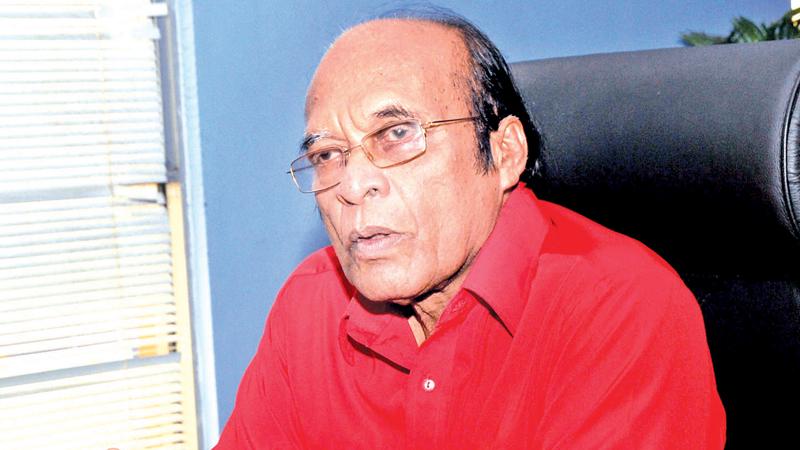
The General Secretary of the Sri Lanka Communist Party and former Cabinet Minister DEW Gunasekera, in an interview with our sister paper, Silumina said that the root cause of the current political enigma in the country stemmed from the economic woes which were the natural consequences of the financial crisis. The 1978 Constitution, followed by the introduction of the neo-liberal economic policy coupled with the new electoral system could be identified as the root cause for the current economic woes.
In short, the current economic crisis has resulted in a serious constitutional riddle.
J.R. Jayewardene’s neo liberal economic policy, a new strategy of capitalism, was assured full freedom to operate with no government interference at all. This new economic policy swept across the world, following the collapse of the Soviet Union in 1991. Privatisation began to take root in the country only during President Premadasa’s regime.
Although capitalism is also an instrument for development, J.R. failed to exploit it due to the war situation in the country from 1983 to 1989. The development drive launched by President Mahinda Rajapaksa was the speediest, with new expressways and ports being built in the country.
However, many problems still remained unresolved which resulted in the decline of state revenue as pointed out by me time and again between 2005-2015. Government revenue is hardly sufficient to meet public servants’ salaries, pensions and day-to-day expenses. Imports far exceed the imports.
As of today the Government has raised loans internally and externally to the tune of Rs. 10 trillion.
The cardinal cause for the current crisis is the fall of state revenue. This was clearly expressed by the people when they voted against the Government during the last local government election.
Although Ranil Wickremesinghe became the Prime Minister, he did not have any power with only 46 MPs while his rivals enjoyed a 2/3 majority. Till the dissolution of Parliament, the SLFP voted for every issue which Ranil Wickremesinghe has forgotten today. He succeeded in getting the consent of the SLFP solely because Mahinda Rajapaksa had handed over the SLFP Chairmanship to President Maithripala Sirisena.
The President took three bold decision namely. (a) Appointment of a new Prime Minister, (b) Proroguing Parliament and (c) Dissolution of Parliament to resolve the policy differences with Prime Minister Ranil Wickremesinghe.
Ranil attempts to vest Presidential powers in him through the 19th Amendment. Perhaps, had the 20th Amendment been passed, the present crisis could have been prevented, which means if the Government does not have a majority, it has to go for an election.
In fact, the 19th Amendment which I also supported has certain salutary features such as Independent Commissions. Ranil Wickremesinghe created many problems and once got up and walked away during the debate on the 19th Amendment.
However, it was due to the intervention of the President, himself, that the differences could be ironed out.
Both the 19th and the 20th Amendments aimed at transforming the Executive Presidency into a Parliamentary system but it never saw the light of day.
Ours is a unique situation, where the President is the Head of State, Head of Government, Head of Cabinet and Commander of the Forces, which is still in force.
In the current political imbroglio, the Supreme Court will be the final arbiter.
I had worked with almost ten Speakers in Parliament and have studied their decisions in Parliamentary history. The Speaker in his first media release accepted the new Prime Minister and a seat in Parliament was accorded to him.
Later, MP Sumanthiran brought a resolution to suspend Standing Orders, the first ever occasion such a thing happened in Parliament.
Former Parliamentary Secretary General, Nihal Seneviratne, reminded me of an incident in Parliament during Premadasa’s presidency and underscored the need to stick to Standing Orders.Standing Orders are meant to ensure the dignity and decorum of Parliament and discipline with the co-operation of the 225 members of Parliament. When you suspend Standing Orders, there is no order in the House, which leaves room for a ‘free for all’. MP Sumanthiran, though a lawyer lacked Parliamentary experience. He should have brought a resolution only to suspend the desired part.
On that day the Speaker should have adjourned the sittings after the leader of the House moved for adjournment with the concurrence of the Party leaders following the President’s proclamation. There was no other business scheduled for the day. The setting up of Selection Committees could be taken up thereafter. If a No-Confidence Motion was to be moved, it should have been included in the Order Paper and thereafter the procedure laid down should have been followed.
The Speaker who observed the dignity of the Speaker’s Chair and the House in the breach, is responsible for the chaotic situation. According to Parliamentary traditions if Prime Minister Mahinda Rajapaksa was defeated by the No-Confidence Motion he has to quit. The Speaker acted in a hurry probably on an ‘order’ from Temple Trees, the veteran Communist said.
The Speaker and all others wanted to internationalise the issue and that is why he had summoned all ambassadors to Parliament.
If the UNP asserts that Prime Minister Mahinda Rajapaksa does not have the majority, former Prime Minister Ranil Wickremesinghe too has a problem. Although the JVP and the TNA agree to vote out Prime Minister Mahinda Rajapaksa from his portfolio, they have never given an undertaking to appoint Ranil Wickremesinghe as the Prime Minister.
He has the support of only a group of one-hundred people and as such, he could never take his oaths as Prime Minister, he said.
Translated by Michael
Kittampahuwa
